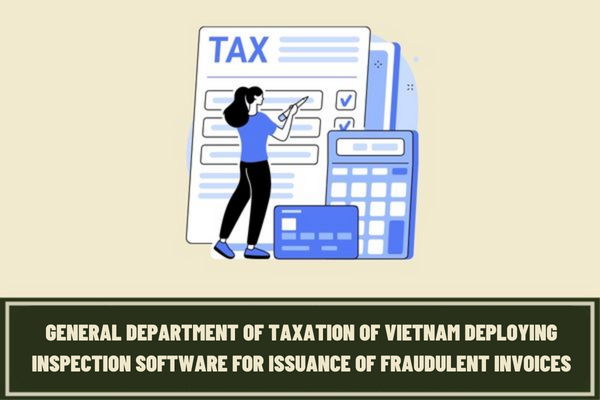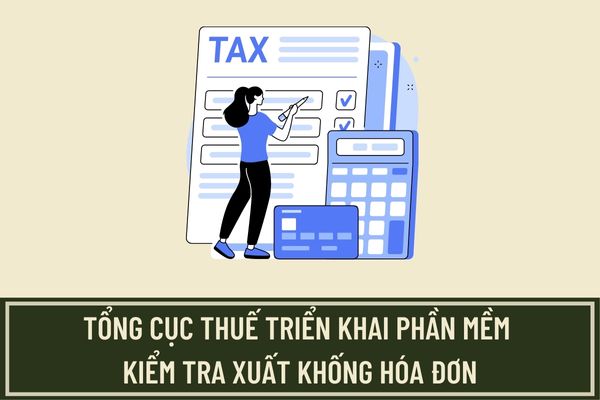General Department of Taxation of Vietnam is testing inspection software for issuance of fraudulent invoices according to Official Dispatch No. 2392/TCT-QLRR in 2023?
- General Department of Taxation of Vietnam is testing inspection software for issuance of fraudulent invoices according to Official Dispatch No. 2392/TCT-QLRR in 2023?
- How to contact support in the process of deploying control software for issuance of fraudulent invoices in Vietnam?
- What is an electronic invoice in Vietnam according to the law?
- Is using fraudulent invoices and evidencing documents considered the act of illegally using invoices or evidencing documents?
General Department of Taxation of Vietnam is testing inspection software for issuance of fraudulent invoices according to Official Dispatch No. 2392/TCT-QLRR in 2023?
According to Official Dispatch No. 2392/TCT-QLRR in 2023, the General Department of Taxation of Vietnam announced that it has developed additional functions to control and prevent short-selling of invoices on the e-Invoice Application, including a number of main functions as follows:
+ The system automatically controls the total value of goods sold on the issued invoices against the threshold value of input goods calculated by K times the total value of inventory and the total value of purchased goods.
+ The alarm system follows parameter K.
According to the plan, the General Department of Taxation of Vietnam will guide this new function to the Tax Departments of the provinces to deploy from June 15, 2023 according to the initial K coefficient; then summarize and evaluate the implementation results from the Tax Departments and decide to apply the K coefficient according to the actual management.
Specifically, cases where taxpayers exceed the threshold will be warned and put on the management list. Use the function to look up the list of warning taxpayers to review and identify cases subject to discontinuation of using invoices as prescribed. Tax authorities use the existing function when deploying e-invoice software to notify them to stop using invoices (meeting the provisions of Article 16 of Decree No. 123/2020/ND-CP).
Before the official implementation, the General Department of Taxation of Vietnam organizes the inspection of control results according to the initial value of K coefficient. The General Department of Taxation of Vietnam proposed the Tax Departments to organize the inspection of "List of taxpayers subject to supervision of invoice issuance exceeding the safe threshold".
The "Invoice usage warning list" function in the e-invoice application serving to control e-invoices and prevent the issue of false invoices on the e-invoice application module is deployed from June 15, 2023.
How to contact support in the process of deploying control software for issuance of fraudulent invoices in Vietnam?
According to Official Dispatch No. 2392/TCT-QLRR in 2023, the Tax Department assigns civil servants in charge of implementing the output "List of taxpayers subject to supervision of invoice issuance exceeding the safe threshold" on the relevant function at Invoice application with the parameter of monitoring date of June 14, 2023 (whereby, the control data will be aggregated until the end of June 14, 2023). On the basis of the rendered list, the tax authority assigns civil servants to carry out inspection of taxpayers according to current regulations.
How to support during the implementation process: For any problems during the implementation process, the Tax Department should contact directly via the focal point:
- About profession:
Via the phone number of the General Department's switchboard: 024.39712555/ext. 8023 (Comrade Nguyen Thi Ngoc Thu, email: ntnthu@gdt.gov.vn).
- About the application:
For any problems during the implementation process, the Tax Department should contact via the Service desk support request management system (https://hotro.gdt.gov.vn) or contact the support department via:
+ Phone number (024) 73 055 999
+ Email:nhomhotrohddt@gdt.gov.vn.

General Department of Taxation of Vietnam is testing inspection software for issuance of fraudulent invoices in Vietnam according to Official Dispatch No. 2392/TCT-QLRR in 2023?
What is an electronic invoice in Vietnam according to the law?
Pursuant to Clause 2, Article 3 of Decree No. 123/2020/ND-CP, “electronic invoice in Vietnam” means an invoice, with or without the tax authority’s authentication code, in the form of electronic data, issued by the goods seller or service provider by using electronic instruments to record information on the sale of goods or service provision in accordance with regulations of the Law on accounting and the Law on taxation, including the invoices generated by POS cash registers that are digitally connected to tax authorities. To be specific:
- “authenticated e-invoice” means an e-invoice that is granted an authentication code by the tax authority before it is sent to the buyer by the goods seller or service provider.
The authentication code on an e-invoice is a unique serial number generated by the tax authority’s system and a series of characters encoded by the tax authority based on the information specified by the seller on the invoice.
- “unauthenticated e-invoice” means an e-invoice that is sent to the buyer by the goods seller or service provider without the tax authority’s authentication code.
Is using fraudulent invoices and evidencing documents considered the act of illegally using invoices or evidencing documents?
According to the provisions of Article 4 of Decree No. 125/2020/ND-CP, using the invoices or evidencing documents in the following cases constitutes the act of illegally using invoices or evidencing documents:
- Invoices or evidencing documents that do not contain all compulsory contents as prescribed; invoices on which information is erased or corrected in breach of regulations;
- Fraudulent invoices or evidencing documents (i.e. invoices or evidencing documents containing details about goods and services which are not partially or entirely rendered); invoices incorrectly reflecting amounts due, or invoices issued as fraudulent, false or fake ones;
- Invoices with discrepancies in amounts paid for goods or services rendered, or discrepancies in required data fields between an invoice’s copies;
- Issued invoices reused with fictitious information for the purpose of transporting goods at the circulation stage or invoices for goods or services which are used for evidencing the rendering of the other goods or services;
- Invoices or evidencing documents of other entities or persons (except if invoices are received from tax authorities and issued under trust) used for certifying the purchased goods or services or the sold goods or services;
- Invoices or evidencing documents in the case where the tax, police or other regulatory authority concludes that they are used illegally.
LawNet
